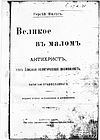- Matvei Golovinski
-
The Protocols 
First publication of The Protocols
Programma zavoevaniya mira evreyamiWriters, editors, and publishers associated with The Protocols
Carl Ackerman · Boris Brasol
G. Butmi · Natalie de Bogory
Denis Fahey · Henry Ford · L. Fry
Howell Gwynne · Harris Houghton
Pavel Krushevan · Victor Marsden
Sergei Nilus · George Shanks
Fyodor Vinberg · Clyde J. WrightDebunkers of The Protocols
Vladimir Burtsev · Herman Bernstein Norman Cohn · John S. Curtiss
Philip Graves · Michael Hagemeister
Pierre-André Taguieff · Lucien WolfCommentaries on The Protocols
The International Jew
The Cause of World Unrest
The Jewish Bolshevism
Mein KampfMatvei Vasilyevich Golovinski (alternatively Mathieu; Russian: Матвей Васильевич Головинский; 1865–1920) was a Russian-French writer, journalist and political activist. Critics studying the Protocols of the Elders of Zion have argued that he was the author of the work. This claim is reinforced by the writings of modern Russian historian Mikhail Lepekhine, who in 1999 studied previously closed French archives stored in Moscow containing information supporting Golovinski's authorship. Back in the mid 1930s, Russian testimony in the Berne Trial had linked the head of Russian security service in Paris, Pyotr Rachkovsky, to the creation of the Protocols.
Contents
Life
Matvei Golovinski was born into an aristocratic family in the village of Ivashevka (Ивашевка), Simbirsk guberniya. His father, Vasili Golovinski (Василий Головинский) was a friend of Fyodor Dostoyevsky. Both were members of the Petrashevsky Circle, sentenced to the capital punishment as conspirators and both were pardoned later. Vasili Golovinski died in 1875 and Matvei Golovinski was reared by his mother and the French nanny.
While studying jurisprudence, Golovinski joined an anti-Semitic counter-revolutionary group Holy Brotherhood ("Святое Братство").[1] Upon graduation, he worked for the Okhrana, secretly arranging pro-government coverage in the press. Golovinski's career almost collapsed and he had to leave the country after his activities were publicly exposed by Maxim Gorky. In France, he wrote and published articles on assignments of the Chief of Russian secret service in Paris, Pyotr Rachkovsky.
After the October Revolution of 1917, Golovinsky switched sides and worked for the Bolsheviks until his death in 1920.
Authorship of the Protocols
On November 19, 1999, Patrick Bishop reported from Paris:
Research by a leading Russian historian, Mikhail Lepekhine, in recently opened archives has found the forgery to be the work of Mathieu Golovinski, opportunistic scion of an aristocratic but rebellious family that drifted into a life of espionage and propaganda work. After working for the czarist secret service, he later changed sides and joined the Bolsheviks. Mr. Lepekhine’s findings, published in the French magazine L'Express, would appear to clear up the last remaining mystery surrounding the Protocols.[1]
In his 2001 book The Question of the Authorship of "The Protocols of the Elders of Zion", a Ukrainian scholar Vadim Skuratovsky offers a scrupulous and extensive literary, historical and linguistic analysis of the original Russian language text of the Protocols. Skuratovsky provides evidence that Charles Joly, a son of Maurice Joly (on whose writings the Protocols are based), visited Saint Petersburg in 1902 and that Golovinsky and Charles Joly worked together at Le Figaro in Paris. Skuratovsky also traces the influences of Dostoyevsky's prose (in particular, The Grand Inquisitor and The Possessed) on Golovinsky's writings, including The Protocols.
In his book The Non-Existent Manuscript. A Study of the Protocols of the Sages of Zion, Italian researcher Cesare De Michelis writes [2] that hypothesis of Golovinski authorship was based on statement by Princess Catherine Radziwill, who claimed that she had seen manuscript of the Protocols written by Golovinsky, Rachkovsky and Manusevich in 1905, but in 1905 Golovinsky and Rachkovsky had already left Paris and moved to Saint-Petersburg. Princess Radziwill was known to be an unreliable source.
Golovinski had been linked to the work before; the German writer Konrad Heiden identified him as an author of the Protocols in 1944.[3]
Golovinski's books (published under the pen-name of Doctor Faust)
- From a Writer's Notebook. M. M. Levin edition. Moscow, 1910. [Belles-lettres and autobiographical prose]
- The Black Book of German Atrocities. Saint Peterburg, 1914.
- An Experience of Criticism of Bourgeois Morals. A. Karelin's translation from French. With a preface by the author. 1919. (The supposed 1910 French original has not been discovered.)
- Conversations with My Grandfather about Typhus. Published by V.M. Bonch-Bruevich (Velichkinoj).
References
- ^ a b Protocols of Zion forger named by Patrick Bishop (Daily Telegraph) November 19, 1999 (Issue 1638)
- ^ Вадим Скуратовский Протоколы Доктор Фауст 1
- ^ Forging Protocols by Charles Paul Freund. Reason Magazine, February 2000
External links
- Paris Okhrana 1885-1905 CIA historical review program (Approved for release 22 September 1993)
- (French) L’origine des Protocoles des sages de Sion by Éric Conan. L'Express, 16 November 1999
- (Russian) The Question of the Authorship of "The Protocols of the Elders of Zion" by Vadim Skuratovsky: Kiev, 2001. ISBN 966-7273-12-1
- (Russian) Literator's Diary, 1999 by Yakov Krotov
- (Russian) One hundred years since the first publication of The Protocols at Radio Liberty
- The Plot by Will Eisner A comic book portraying Glovinski from boyhood to death, and focusing on his alleged authorship of the Protocols.
Categories:- 1865 births
- 1920 deaths
- Russian journalists
- French journalists
- Protocols of the Elders of Zion
- Okhrana personnel
- Antisemitism
Wikimedia Foundation. 2010.
